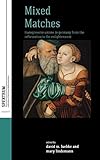Mixed Matches : Transgressive Unions in Germany from the Reformation to the Enlightenment / ed. by Mary Lindemann, David M. Luebke.
Material type: TextSeries: Spektrum: Publications of the German Studies Association ; 8Publisher: New York ; Oxford : Berghahn Books, [2014]Copyright date: ©2014Description: 1 online resource (252 p.)Content type:
TextSeries: Spektrum: Publications of the German Studies Association ; 8Publisher: New York ; Oxford : Berghahn Books, [2014]Copyright date: ©2014Description: 1 online resource (252 p.)Content type: - 9781782384090
- 9781782384106
- 306.810943 23
- online - DeGruyter
| Item type | Current library | Call number | URL | Status | Notes | Barcode | |
|---|---|---|---|---|---|---|---|
 eBook
eBook
|
Biblioteca "Angelicum" Pont. Univ. S.Tommaso d'Aquino Nuvola online | online - DeGruyter (Browse shelf(Opens below)) | Online access | Not for loan (Accesso limitato) | Accesso per gli utenti autorizzati / Access for authorized users | (dgr)9781782384106 |
Frontmatter -- CONTENTS -- Introduction. Transgressive Unions -- Chapter 1. “It Is Not Forbidden that a Man May Have More Th an One Wife”: Luther’s Pastoral Advice on Bigamy and Marriage -- Chapter 2. Celibacy—Marriage—Unmarriage: The Controversy over Celibacy and Clerical Marriage in the Early Reformation -- Chapter 3. “Nothing More than Common Whores and Knaves”: Married Nuns and Monks in the Early German Reformation -- Chapter 4. Transgressive Unions and Concepts of Honor in Early Modern Defamation Lawsuits -- Chapter 5. Negotiating Rank in Early Modern Marital Mismatches -- Chapter 6. Between Conscience and Coercion: Mixed Marriages, Church, Secular Authority, and Family -- Chapter 7. The Rhetoric of Difference: The Marriage Negotiations between Queen Christina of Sweden and Elector Friedrich Wilhelm of Brandenburg -- Chapter 8. Mixed Matches and Inter-Confessional Dialogue: The Hanoverian Succession and the Protestant Dynasties of Europe in the Early Eighteenth Century -- Chapter 9. Transethnic Unions in Early Modern German Travel Literature -- Chapter 10. The Meaning of Love: Emotion and Kinship in Sixteenth-Century Incest Discourses -- Chapter 11. Aufklärung, Literature, and Fatherly Love: An Eighteenth-Century Case of Incest -- Afterword. Shifting Boundaries and Boundary Shifters: Transgressive Unions and the History of Marriage in Early Modern Germany -- Bibliography -- Notes on Contributors -- Index
restricted access online access with authorization star
http://purl.org/coar/access_right/c_16ec
The significant changes in early modern German marriage practices included many unions that violated some taboo. That taboo could be theological and involve the marriage of monks and nuns, or refer to social misalliances as when commoners and princes (or princesses) wed. Equally transgressive were unions that crossed religious boundaries, such as marriages between Catholics and Protestants, those that violated ethnic or racial barriers, and those that broke kin-related rules. Taking as a point of departure Martin Luther’s redefinition of marriage, the contributors to this volume spin out the multiple ways that the Reformers’ attempts to simplify and clarify marriage affected education, philosophy, literature, high politics, diplomacy, and law. Ranging from the Reformation, through the ages of confessionalization, to the Enlightenment, Mixed Matches addresses the historical complexity of the socio-cultural institution of marriage.
Mode of access: Internet via World Wide Web.
In English.
Description based on online resource; title from PDF title page (publisher's Web site, viewed 25. Jun 2024)


